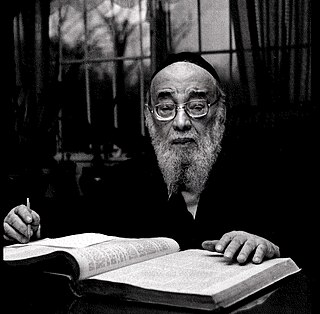
Yitzchak Hutner, also known as Isaac Hutner, was an American Orthodox rabbi and rosh yeshiva (dean).

Yeshiva Rabbi Chaim Berlin or Yeshivas Rabbeinu Chaim Berlin is an American Haredi Lithuanian-type boys' and men's yeshiva in Brooklyn, New York. The school's divisions include a preschool, a yeshiva ketana, a mesivta, a college-level beth midrash, and Kollel Gur Aryeh, its post-graduate kollel.

Shraga Feivel Mendlowitz was a leader of American Orthodox Judaism and founder of institutions including Torah U'Mesorah, an outreach and educational organization. In 1921 he became principal of Yeshiva Torah Vodaath, an early Brooklyn-based yeshiva founded in 1918. He subsequently added a high school and postgraduate program to the yeshiva. His policies were often informed by the Orthodox philosophical movement Torah im Derech Eretz.

Ner Israel Rabbinical College, also known as NIRC and Ner Yisroel, is a Haredi yeshiva in Pikesville, Maryland. It was founded in 1933 by Rabbi Yaakov Yitzchok Ruderman, a disciple of Rabbi Nosson Tzvi Finkel, dean of the Slabodka yeshiva in Lithuania. Rabbi Aharon Feldman, a disciple of Rabbi Ruderman and a member of the Moetzes Gedolei HaTorah of America, became its head in 2001.
Rosh yeshiva is the title given to the dean of a yeshiva, a Jewish educational institution that focuses on the study of traditional religious texts, primarily the Talmud and the Torah, and halakha.
Refael Reuvain Grozovsky was a leading Orthodox rabbi, Jewish religious leader and rosh yeshiva ("dean") known for his Talmudic analytical style.

Yaakov Kamenetsky, was a prominent rabbi, rosh yeshiva, posek and Talmudist in the post-World War II American Jewish community.

Yaakov Yitzchok Ruderman was a Russian-born American Talmudic scholar and rabbi who founded and served as rosh yeshiva of Yeshivas Ner Yisroel in Baltimore.

Moetzes Gedolei HaTorah is the supreme rabbinical policy-making council of the Agudat Yisrael and Degel HaTorah movements in Israel; and of Agudath Israel of America in the United States. Members are usually prestigious Roshei Yeshiva or Hasidic rebbes, who are also usually regarded by many Haredi Jews to be the Gedolim ("great/est") sages of Torah Judaism. Before the Holocaust, it was the supreme authority for the World Agudath Israel in Europe.
Shlomo Heiman, (1892–1944) known informally as "Reb Shlomo", was a rabbi, Talmudist, and rosh yeshiva. He led some of the most prominent yeshivas in Europe and the United States.
Beth Medrash Elyon is a four-year, not-for-profit yeshiva in Monsey, New York.

The Malachim is a small Hasidic group. It adheres to the Chabad school of Hasidic thought which emphasizes in-depth Torah study, uses the Chabad nusach of prayer, and focuses on the study of Hasidic mysticism.
Chaim Avraham Dov Ber Levine, known as "the Malach", was a rabbi and founder of the Malachim.
Yeshiva Torah Temimah is an Orthodox yeshiva with branches in Brooklyn, New York and Lakewood, New Jersey.

Beth Medrash Govoha is a Haredi Jewish Lithuanian yeshiva in Lakewood Township, New Jersey. It was founded by Rabbi Aharon Kotler in 1943 and is the second-largest yeshiva in the world, after Mir Yeshiva in Jerusalem. As of 2019, it had 6,715 students, 2,748 regular and 3,967 in Kollel status. The principal Rosh yeshiva since 1982 is Rabbi Malkiel Kotler. Talmud and halakha studies in the institution are carried in the form of over 200 small groups, Chaburos, which consist of several students mentored by a veteran, each pursuing its own specific curriculum with an emphasis on individual learning.
Irving M. Bunim was a businessman, philanthropist, and a lay leader of Orthodox Jewry, in particular the Young Israel movement in the United States from the 1930s until his death in 1980. As an assistant to Aharon Kotler, he was involved in aspects of Torah dissemination, philanthropy and Holocaust rescue. He has been referred to as "perhaps the most impactful lay leader in American Jewish history".
Mesivta is an Orthodox Jewish yeshiva secondary school for boys. The term is commonly used in the United States to describe a yeshiva that emphasizes Talmudic studies for boys in grades 9 through 11 or 12; alternately, it refers to the religious studies track in a yeshiva high school that offers both religious and secular studies.
Rabbi Sholom Rivkin was an Israeli-born American rabbi. He was the last Chief Rabbi of St. Louis, Missouri, and the last chief rabbi of one of only a few cities in the United States that has ever had a chief rabbi. He held the post of Chief Rabbi from 1983 until 2005 and was Chief Rabbi Emeritus until his death in 2011. He was also a chief judge on the Beth Din of the Rabbinical Council of America, and head of the Vaad Hoeir of St. Louis, the governing body of the St. Louis Orthodox Jewish community. He was an expert in Jewish law, especially family and divorce law, and was consulted by rabbis and rabbinical courts around the world.











